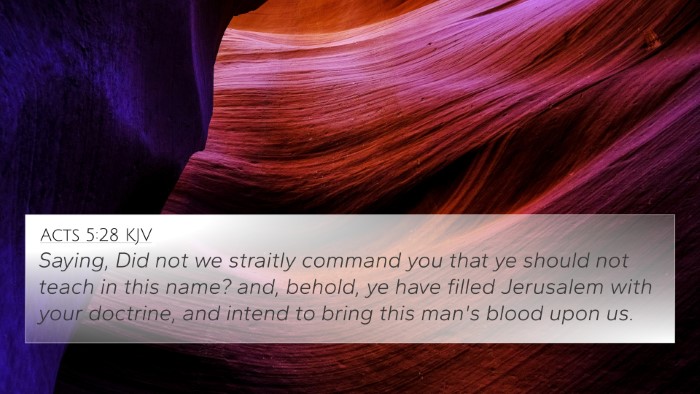Understanding Luke 9:49
Luke 9:49 states: “John answered and said, Master, we saw one casting out devils in thy name; and we forbad him, because he followed not with us.” This verse occurs in the context of the disciples grappling with who has authority to act in Jesus’ name, highlighting themes of inclusivity and the recognition of diverse expressions of faith. Below, we explore the meanings and implications of this verse, enriched by insights from established commentaries.
Insights from Commentaries
Public domain commentaries provide rich insights into Scripture. Here are some prominent interpretations of Luke 9:49:
- Matthew Henry:
Henry emphasizes the importance of recognizing the work of others who do good in Jesus’ name, highlighting a spirit of unity among believers. He suggests that the disciples' tendency to restrict the authority of others contradicted the universal call to ministry.
- Albert Barnes:
Barnes provides a broader context, suggesting that the act of casting out demons in Jesus’ name signifies genuine faith and power, whether done knowingly with the disciples or not. He advises against dismissing those not in one’s immediate circle of fellowship.
- Adam Clarke:
Clarke interprets John’s concern as reflective of the disciples’ desire for exclusivity, which can undermine the mission of Christ. He suggests that Jesus’ response to this situation would teach the disciples about inclusiveness in His ministry.
Thematic Connections
Luke 9:49 creates thematic connections with other Bible verses. Here are some notable parallels:
- Mark 9:38-40: Similar account emphasizing the acceptance of those who act in Jesus’ name but are not part of the immediate group.
- Matthew 12:30: Highlights that those not gathered with Christ are scattering, indicating a broader understanding of His ministry.
- Philippians 1:15-18: Paul speaks about others preaching Christ out of rivalry or goodwill, affirming the value in diverse expressions of faith.
- John 10:16: Jesus mentions other sheep not of His fold, referencing the inclusive nature of His gathering of believers.
- Acts 10:34-35: Peter’s realization that God shows no partiality and accepts those from every nation who fear Him.
- Galatians 3:28: Emphasizes the unity of believers in Christ, irrespective of their origin or background.
- 1 Corinthians 12:12-13: The body of Christ as a diverse assembly with many members demonstrates the value of inclusivity in ministry.
Cross-Referencing Biblical Texts
The practice of cross-referencing allows for deeper understanding of Scripture, connecting insights across the Biblical narrative. Here we explore how Luke 9:49 offers opportunities for scriptural cross-referencing:
- Understanding Contextual Authority: Highlighting the need for a comprehensive understanding of authority in Christ across different texts.
- Cultivating an Attitude of Inclusivity: Reflecting the call for unity among believers while celebrating diversity in ministry practices.
- Expanding Perceptions of Ministry: Encouraging readers to consider how various individuals can serve God’s purposes even if they are outside of traditional group settings.
Application and Reflection
In applying the lessons from Luke 9:49, believers are encouraged to:
- Embrace the work of God done through others, even if they are not part of one’s own community.
- Cultivate an understanding that God’s mission is broader than human affiliations and denominations.
- Practice humility and openness in recognizing that others may also be instruments of God’s power.
Conclusion: Linking Bible Scriptures
Luke 9:49 serves as a vital reminder of the importance of recognizing God’s work among diverse groups of believers. By understanding and utilizing tools for Bible cross-referencing, we can deepen our insights and foster unity among those who share a common faith in Christ. The interconnectedness of scripture, revealed through cross-references, opens up avenues for richer interpretations and applications of God’s word.
Additional Resources
If you are interested in further exploration of Biblical themes and cross-referencing methods, consider utilizing:
- Bible concordance for finding key themes and connections between verses.
- How to use Bible cross-references for personal study or sermon preparation.
- Comprehensive Bible cross-reference materials for in-depth study, examining thematic ties and parallels.










